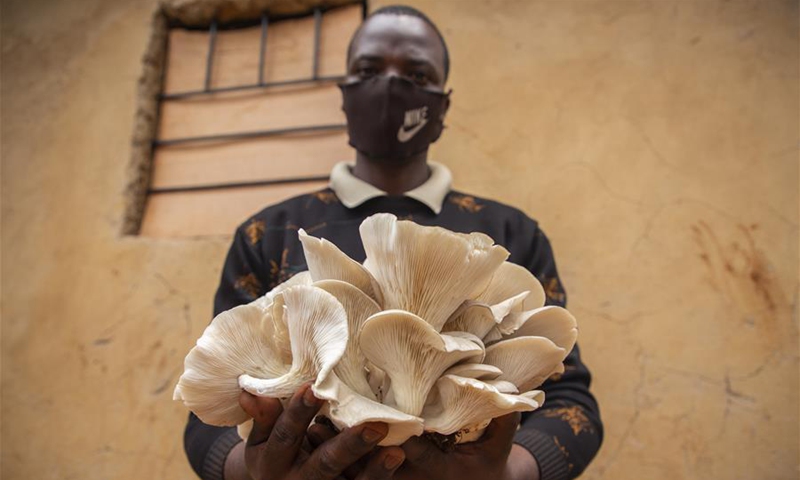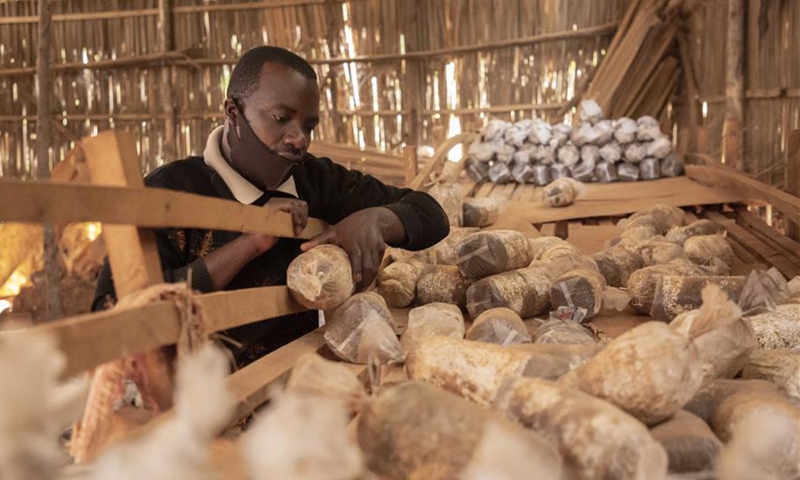Chinese Juncao technology opens door for Rwandan worker to start business
Source: Xinhua Published: 2020/10/27 9:20:52

Emmanuel Ahimana, owner of a Rwandan company that applies Chinese-invented Juncao technology to grow mushrooms, poses for a photo with mushrooms at his workshop in Kigali, capital city of Rwanda, Sept. 9, 2020. (Photo by Cyril Ndegeya/Xinhua)

Emmanuel Ahimana, owner of a Rwandan company that applies Chinese-invented Juncao technology to grow mushrooms, checks mushroom tubes at his workshop in Kigali, capital city of Rwanda, Sept. 9, 2020. (Photo by Cyril Ndegeya/Xinhua)
At Emmanuel Ahimana's workshop in Kigali, two workers were carefully mixing various materials such as Juncao powder, cotton husks, lime powder and water before putting them into vessels to kill bacteria.
His company applies Chinese-invented Juncao technology to grow mushrooms by using these low-cost materials. One mushroom tube costs Ahimana only several hundreds Rwandan francs (100 Rwandan francs is around equal to 0.1 U.S. dollars), while mushrooms each tube cultivates could be sold at several times the amount.
Once a mechanical technician of a sugar factory in western Rwanda but now a young entrepreneur, he hires two permanent staff and 30 casual laborers for mushroom business and the number of the employees could increase during the harvest.
The agricultural technology uses Juncao, which literally means "mushroom" and "grass," to grow mushrooms. It can help increase income through low-cost mushroom cultivation and contain desertification by providing a new source of cattle feeds.
The technology was invented by professor Lin Zhanxi from China's Fujian Agriculture and Forestry University in the 1980s, and has been shared with over 100 countries, including Rwanda.
Since 2006, the university's experts have been carrying out cooperation with the Rwandan government on Juncao technology, teaching and promoting Juncao and other agricultural technologies in the central African nation.
The 34-year-old learned Juncao technology from the Chinese experts while working with them from 2008 to 2016 as a Juncao worker.
Ahimana founded his Juncao company in 2016 by his personal savings because of his passion in working in Juncao sector and profits it could bring.
After four years development, the company's production capacity of mushroom tubes has increased from about 1,500 to 2,000 per month at the beginning to current 10,000 tubes per month.
Mushrooms grown by the company are now sold to local customers in bulks, who then resell them to hotels, supermarkets as well as Rwandans and foreigners in local markets. Before COVID-19, they were also exported to the neighboring Uganda and the Democratic Republic of the Congo.
"Many people in Rwanda are not aware that mushroom farming is a profitable business that can help fight poverty," he said.
The Juncao business helps the entrepreneur pay school fees for his children who have started school, according to him.
"I can put food on the table, and I am financially stable," he said, adding that Juncao technology is a positive invention in terms of improving soil management and nutrition.
Juncao technology has contributed to job creation, food security and generating income for rural communities in Rwanda and has played an important role in tackling malnutrition in the country, said Josiane Umubyeyi, a research technician and acting coordinator of Juncao technology at the Rwanda Agriculture Board.
"The technology uses materials that can be purchased locally and is applicable on a small scale, so it is a good opportunity for many households," she told Xinhua.
The agriculture board is looking to promote the technology to be widespreadly used by integrating mushroom cultivation into the overall development of kitchen gardens at people's home, she said.
Posted in: BIZ